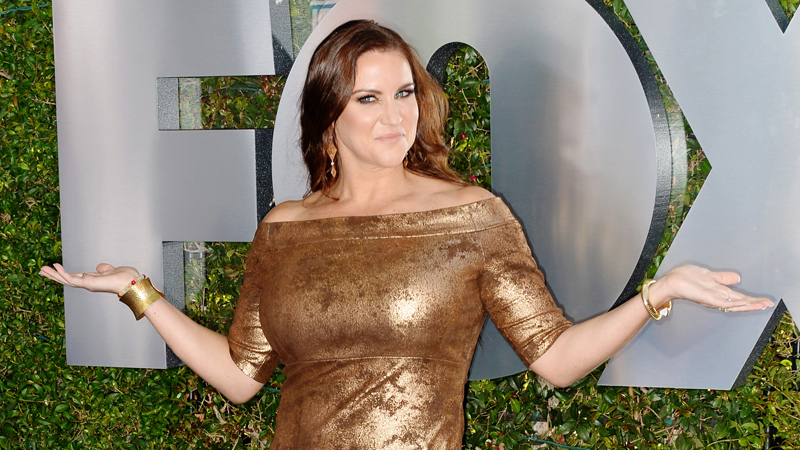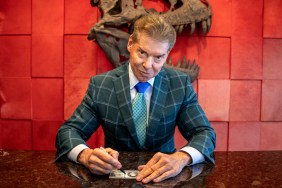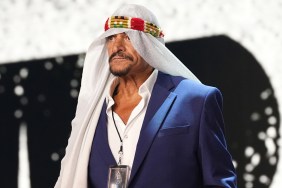Stephanie McMahon sat down for an interview with Jeanine Poggi of Ad Age to speak on WWE’s behalf regarding several major topics, including adjusting during the COVID-19 pandemic and the focus on diversity in the company following the Black Lives Matter movement.
COVID-19 & Pivoting During The Pandemic
Poggi starts off the conversation by asking Stephanie how she felt about WWE being considered an essential business in the state of Florida and the Chief Branding Officer used a phrase that wrestling fans are all too familiar with.
“Well, WWE’s mission is to put smiles on people’s faces the world over and we actually considered it a responsibility as long as we could do it safely to continue to produce our programming and so as such we have not been off the air,” she said. “We have continued to produce our seven hours of weekly content. It’s three hours every Monday night for USA Network, two hours every Wednesday night for USA Network and two every Friday night for SmackDown, including then, what our PPV or Network Specials, pretty much monthly.”
As far as the adjustments being made to the current product are concerned amid the global pandemic, Stephanie talks about the difficult pivot being made at having to move away from an actual live audience every week.
“For WWE, we definitely miss our fans. I think for any live event, our fans are part of our show. They’ve always been our secret sauce and we miss them dearly, but that doesn’t mean they’re not there, they’re not watching, they’re just not live giving us that real time feedback. We’ve always leveraged and utilized our social media channels to listen to our fans as well, but certainly now that is heightened from a data and analytics perspective. We’ve also had a few key learnings in camera angles. How not to shoot the audience. Our commentators now, we used to encourage them to lay out more so you could get a lot more of the natural sound and now we’re encouraging them to fill that gap, that space. We’ve experimented with various different forms of augmented reality.Typically in our Performance Center there are some big actual fans, not fans the people, but fans in the air and it doesn’t necessarily look the best on TV so we now have put in a virtual ceiling.
“We’ve tried sweetening the audio, so now we do have some of our developmental Superstars, those who are in training, we’ve had them act as fans, socially distance with masks to provide some audio and some atmosphere and we’ve experimented with sweetening that audio, turning it up so you can actually hear the cheers or the boos, eccetra and we’ve learned a lot. Sometimes we’ve overdone it and again, we track the feedback from our fans, from our actual fans who said, ‘Yeah that was too much, it wasn’t believable,’ or ‘Wow, I really loved that, it helped me feel more engaged,’ so we’re constantly evaluating and shifting in accordance with what our fans are saying and what technology is available.”
“It’s forcing innovation and innovation is critical in today’s world,” she adds. “It always has been but especially now during COVID.”
Poggi asks what changes has the pandemic caused that Stephanie believes will stick around once massive live audiences will be allowed back in the global fold.
“Well, I think that that happens soon than later so I’ll just throw that out there to the universe, but also I think there’s a number of different features. I think viewership patterns have certainly shifted more to digital viewing. I don’t really think that’s going to change that much.”
McMahon also believes that there will be new ways to engage with advertisers to co-create the viewing experience. She also believes augmented and virtual reality will linger around.
“I think also a little bit of this seeing people of who they really are and not so necessarily polished from highly produced environments, eccetera. I think we’ve learned that there is a desire to really get to know people behind the scenes, who the real people are. Who are either making the decision or the athletes that are competing or the WWE Superstars in the ring. I think there really is a desire to break down those barriers and get to know people on personal level. It’s that authenticity piece really amped up.”
The Testing Process At The WWE Performance Center
The next topic down the line was the actual testing process that takes place, but Stephanie does take a moment to state even though they are considered essential in Florida, talent and employees still have a choice about when it comes to attendance.
“First and foremost, it’s all optional,” she said. “It’s volunteer-based so all our performers and our crew, it’s up to them whether or not they want to participate and we did have a couple of talent opt out and a couple of crew members opt out for various personal reasons and of course we support that.”
Stephanie then covers the testing process that has recently been implemented at the Performance Center.
“It is the more advance testing. It’s not the rapid test which has shown to have a number of false positive and false negatives though all of the testing is improving, but we want to ensure that we have the best testing possible, of course, because the health and safety of our crew and our performers and our employees are paramount.
She also talks about a spray from Allied Science that they use to “create a barrier” to protect employees from the virus and mentions that even if you do test negative, you do have to come in for a temperature check and fill out a form.
Poggi asks straight out to Stephanie if she believes continuing to have these tapings in Florida at the beginning of the outbreak was the right move.
“I do and I mean Orlando is where our Performance Center is based so we didn’t just choose Orlando hoping that it was gonna prove to be the best location, that was the location and I do think that we’ve done the best that we’ve possibly can. I think the testing and protocols have actually proven that they work. Yes, we have had some positives but the majority of our talent, performers and crew are very healthy and continuing to be a part of our show so we’re proud. Of course we want to be smart, we want to be sensitive, we want to take care of all of our people. Without them we don’t have a show and we don’t have a product but we also want to make sure that we entertain our fans all over the world and we’re proud of the fact that we’re able to do that.”
Covering Diversity In WWE
After that did come the topic of diversity, and Stephanie ran through some numbers before stating that plenty of black talent on the roster have been proactive in their own causes.
“WWE actually over-indexes with our African American audience. 21% of our audience is African American so we’ve utilized our platforms to really amplify the message of inclusion and standing against racism and racial injustice. We’ve amplified our talent’s voices. We have any number of talent who are doing a number of initiatives.
“We’re really taking a hard look and a different look from every level it’s supported throughout our company from the top down, including our board so we are absolutely taking this very seriously, as we should, as everybody should cause it’s going to take every single person to enact change.”
Stephanie adds the following as well:
“About roughly 40% of our champions right now are African American across the men’s and women’s and of course, our three brands, RAW, SmackDown and NXT, so I think that representation is critical.”
Stephanie then goes onto promote the “Women’s Evolution” that took place earlier and noting the two women appearances that took place in Saudi Arabia. Poggi then makes note of companies and organizations adjusting their branding to be more inclusive and mentions the Washington Redskins removing their name. She asks Stephanie if WWE is taking any steps akin to that in their company.
“We’re looking at everything. From a storyline perspective, from a character perspective, from an employee perspective we really are because again like I just said, representation matters and we want to make sure also that our talent’s voices are heard. So when we’re crafting characters in WWE it’s not just, ‘Hey, you’re going to be this particular character and that’s it and you have no say in the matter and here’s your script and that’s it. Our superstars have the opportunity to give their feedback. They help us create the character. They help with what they’re saying and we’ve had instances where we’ve had talent say, ‘Listen this doesn’t feel good to me,’ African-American talent say, ‘This doesn’t feel good to me,’ and this was actually pre-George Floyd but those conversations happen and I think they’re important and you can’t be afraid to have those conversations. You have to be willing to listen, you have to be willing to admit that you might just not know something. You might not understand each other and the only way we’re ever going to learn from each other is if we truly listen and value each other’s feedback.”
Health Insurance For Talent Gets Mentioned
As the interview nears its end, a viewer does asks the question “What kind of ongoing health insurance and medical coverage (mental and physical) does WWE provide for all talent (current and retired)?” McMahon does note that talent are independent contractors so they do not get medical coverage, but injuries sustained on the job are completely covered and anyone that currently or previously suffers from substance abuse issues has the option for help under the WWE’s policy. Her feed does freeze at a point, but does note talent looking to address their mental health can go to a WWE doctor who can direct them to the proper professional for added assistance.
(Transcription credit should go to @DominicDeAngelo of WrestleZone)
You can watch Stephanie’s entire interview with Ad Age below:
RELATED: Vince McMahon, Triple H, Steph McMahon, And Kevin Dunn Sell $2.5 Million Of WWE Stock









